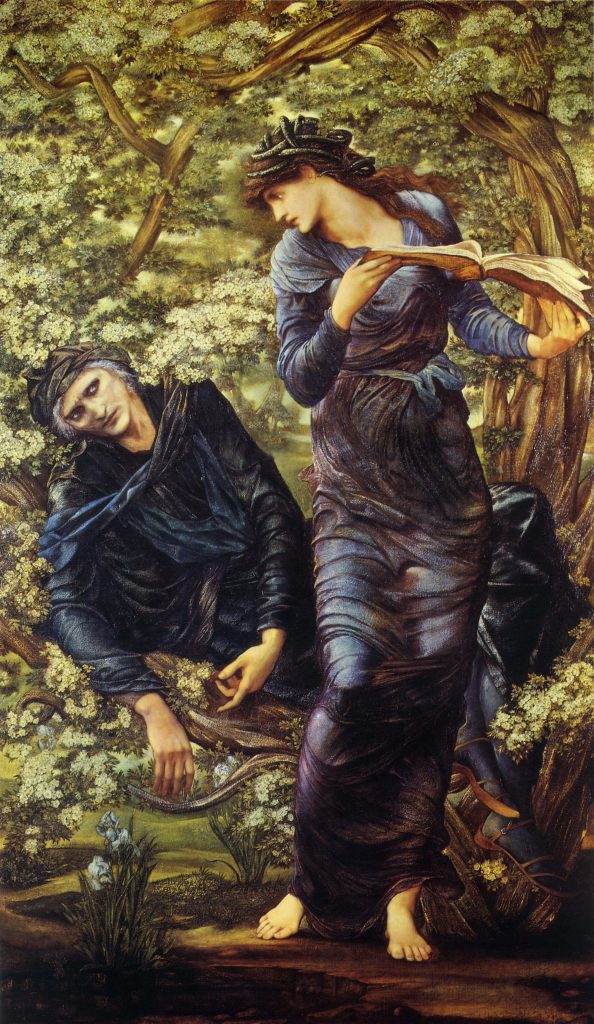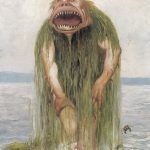It was in this same verdant Broceliande that Vivien, another fairy, that crafty dame of the enchanted lake, the instructress of Lancelot, bound wise Merlin so that he might no more go to Camelot with oracular lips to counsel British Arthur.
But what say the folk of Broceliande themselves of this?

Let us hear their version of a tale which has been so battered by modern criticism, and which has been related in at least half a score of versions, prose and poetic. Let us have the Broceliande account of what happened in Broceliande.{fr. 1} Surely its folk, in the very forest in which he wandered with Vivien, must know more of Merlin’s enchantment than we of that greater Britain which he left to find a paradise in Britain the Less, for, according to Breton story, Merlin was not imprisoned by magic art, but achieved bliss through his love for the fairy forest nymph.
Disguised as a young student, Merlin was wandering one bright May morning through the leafy glades of Broceliande, when, like the Seigneur of Nann, he came to a beautiful fountain in the heart of the forest which tempted him to rest. As he sat there in reverie, Vivien, daughter of the lord of the manor of Broceliande, came to the water’s edge. Her father had gained the affection of a fay of the valley, who had promised on behalf of their daughter that she should be loved by the wisest man in the world, who should grant all her wishes, but would never be able to compel her to consent to his.
Vivien reclined upon the other side of the fountain, and the eyes of the sage and maiden met. At length Merlin rose to depart, and gave the damsel courteous good-day. But she, curious and not content with a mere salutation, wished him all happiness and honour. Her voice was beautiful, her eyes expressive, and Merlin, moved beyond anything in his experience, asked her name. She told him she was a daughter of a gentleman of that country, and in turn asked him who he might be.
“A scholar returning to his master,” was the reply.
“Your master? And what may he teach you, young sir?”
“He instructs me in the magic art, fair dame,” replied Merlin, amused. “By aid of his teaching I can raise a castle ere a man could count a score, and garrison it with warriors of might. I can make a river flow past the spot on which you recline, I can raise spirits from the great deeps of ether in which this world rolls, and can peer far into the future–aye, to the extreme of human days.”
“Would that I shared your wisdom!” cried Vivien, her voice thrilling with the desire of hidden things which she had inherited from her fairy mother. “Teach me these secrets, I entreat of you, noble scholar, and accept in return for your instruction my most tender friendship.”
Merlin, willing to please her, arose, and traced certain mystical characters upon the greensward. Straightway the glade in which they sat was filled with knights, ladies, maidens, and esquires, who danced and disported themselves right joyously., A stately castle rose on the verge of the forest, and in the garden the spirits whom Merlin the enchanter had raised up in the semblance of knights and ladies held carnival. Vivien, delighted, asked of Merlin in what manner he had achieved this feat of faëry, and he told her that he would in time instruct her as to the manner of accomplishing it. He then dismissed the spirit attendants and dissipated the castle into thin air, but retained the garden at the request of Vivien, naming it ‘Joyous Garden.’
Then he made a tryst with Vivien to meet her in a year on the Vigil of St John.
Now Merlin had to be present at the espousal of Arthur,
his King, with Guinevere, at which he was to assist the archbishop, Dubric, as priest. The festivities over, he recalled his promise to Vivien, and on the appointed day he once more assumed the guise of a travelling scholar and set out to meet the maiden in the forest of Broceliande. She awaited him patiently in joyous Garden, where they partook of a dainty repast. But the viands and the wines were wasted upon Merlin, for Vivien was beside him and she alone filled his thoughts. She was fair of colour, and fresh with the freshness of all in the forest, and her hazel eyes made such fire within his soul that he conceived a madness of love for her that all his wisdom, deep as it was, could not control.
But Vivien was calm as a lake circled by trees, where no breath of the passion of tempest can come. Again and again she urged him to impart to her the secrets she so greatly longed to be acquainted with. And chiefly did she desire to know three things; these at all hazards must she have power over. How, she asked, could water be made to flow in a dry place? In what manner could any form be assumed at will? And, lastly, how could one be made to fall asleep at the pleasure of another?
“Wherefore ask you this last question, demoiselle?” said Merlin, suspicious even in his great passion for her.
“So that I may cast the spell of sleep over my father and my mother when I come to you, Merlin,” she replied, with a beguiling glance, “for did they know that I loved you they would slay me.”
Merlin hesitated, and so was lost. He imparted to her that hidden knowledge which she desired. Then they dwelt together for eight days in the joyous Garden, during which time the sage, to Vivien’s delight and amaze, related to her the marvellous circumstances of his birth.
Next day Merlin departed, but came again to Broceliande when the eglantine was flowering at the edge of the forest. Again he wore the scholar’s garments. His aspect was youthful, his fair hair hung in ringlets on his shoulders, and he appeared so handsome that a tender flower of love sprang up in Vivien’s heart, and she felt that she must keep him ever near her. But she knew full well that he whom she loved was in reality well stricken in years, and she was sorrowful. But she did not despair.
“Beloved,” she whispered, “will you grant me but one other boon? There is one secret more that I desire to learn.”
Now Merlin knew well ere she spoke what was in her mind, and he sighed and shook his head.
“Wherefore do you sigh?” she asked innocently.
“I sigh because my fate is strong upon me,” replied the sage. “For it was foreseen in the long ago that a lady should lead me captive and that I should become her prisoner for all time. Neither have I the power to deny you what you ask of me.”
Vivien embraced him rapturously.
“Ah, Merlin, beloved, is it not that you should always be with me?” she asked passionately. “For your sake have I not given up father and mother, and are not al my thoughts and desires toward you?”
Merlin, carried away by her amorous eloquence, could only answer: “It is yours to ask what you will.”
Vivien then revealed to him her wish. She longed to learn from his lips an enchantment which would keep him ever near her, which would so bind him to her in the chains of love that nothing in the world could part him from her. Hearkening to her plea, he taught her such enchantment as would render him love’s prisoner for ever.
Evening was shrouding the forest in soft shadows when Merlin sank to rest. Vivien, waiting until his deep and regular breathing told her that he was asleep, walked nine times around him, waving her cloak over his head, and muttering the mysterious words he had taught her. When the sage awoke, he found himself in the joyous Garden with Vivien by his side.
“You are mine for ever,” she murmured. “You can never leave me now.”
“My delight will be ever to stay with you,” he replied, enraptured. “And oh, beloved, never leave me, I pray you, for f am bespelled so as to love you throughout eternity!”
Never shall I leave you,” she replied; and in such manner the wise Merlin withdrew from the world of men to remain ever in the joyous Garden with Vivien. Love had triumphed over wisdom.
The Arthurian version of the story does not, of course, represent Vivien as does the old Breton legend. In Geoffrey of Monmouth’s book and in the Morte d’Arthur she is drawn as the scheming enchantress who wishes to lure Merlin to his ruin for, the joy of being able to boast of her conquest. In some romances she is alluded to as Nimue, and in others is described as the daughter of Dyonas, who perhaps is the same as Dylan, a Brythonic (British) sea-god. As the Lady of the Lake she is the foster-mother of Lancelot, and we should have no difficulty in classing her as a water deity or spirit very much like the Korrigan.








